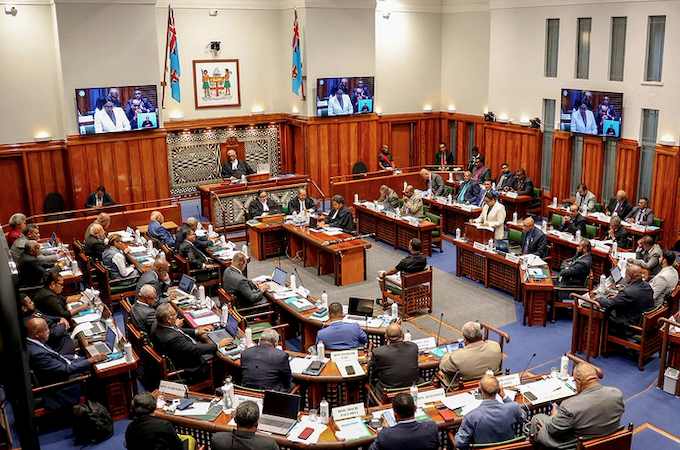
By Repeka Nasiko in Suva
“Let other people decide your salaries” is the latest message in the Fiji parliamentary pay controversy.
This is the call of Fiji’s longtime House of Representatives Secretary Edward Blakelock, who believes that the Special Emoluments Committee must be independent.
He said the Emoluments Committee, traditionally comprised independent consultants who were not sitting parliamentarians and cabinet ministers.
- READ MORE: Fiji’s main opposition FijiFirst sacks 17 MPs who voted for pay rise
- Other Fiji Parliament pay rise reports
Fiji Labour Party leader Mahendra Chaudhry echoed similar sentiments, adding the report on the review of emoluments for parliamentarians should have been cleared by Finance Minister Professor Biman Prasad in cabinet before it was tabled in Parliament.
RNZ Pacific reports that the political fallout from Fijian parliamentarians giving themselves a pay rise last week is spiralling out of control after the main opposition — FijiFirst, the largest single political party in Parliament — sacked 17 out of 26 of its MPs.
While Parliament decides on the make-up of the Special Emoluments Committee, Blakelock said it should not comprise ministers and members of Parliament.
The Parliamentary Remunerations Act 2014 does not spell out who should be members of this committee, but in accordance with parliamentary tradition, the body is expected to be independent of the Parliament.
It should not include current sitting members as committee members so as to ensure no conflict of interest but to be eventually be answerable to Parliament in terms of the approval of its report.
Not eligible
He said the 1997 Constitution specified that exclusion under Section 83 (4) — that a person whose renumeration is reviewable by the Parliamentary Emoluments Committee is not eligible to be appointed as a member.
“As a matter of principle, I personally believe that a member of Parliament — whether a minister or not — should not be a member of a committee which reviews their own salaries, allowances and benefits purely because of conflict of interests issues and just basic fairness,” said Blakelock.
“As mentioned earlier, the 1997 Constitution specifies that exclusion in no uncertain terms.
“In other words, members are expected to be drawn from outside of the current membership of Parliament.
“The Parliament itself chooses by agreement who should be a member of the committee.
“Again, Parliament has to act within the confines of the relevant constitutional provisions and precedence, as well as the provisions in the Parliamentary Remunerations Act 2014.
“I would have thought that if the committee had comprised of members who are not current sitting members of Parliament, we would certainly not be going through all these rigmaroles today.
Independent committee
“The committee should, in my opinion, be independent and consist of experienced and qualified persons from outside of Parliament.”
The 2013 Constitution requires that Parliament “must, under its rules and orders, establish committees with the functions of scrutinising government administration and examining Bills and subordinate legislation and such other functions as are specified from time to time in the rules and orders of Parliament”.
And according to Parliament’s Standing Orders on Special Committees, a special committee may be established by a resolution of Parliament to carry out the assignment specified in the resolution.
This allowed Parliament to pass a resolution on July 12, 2023, for the establishment and membership of the Special Emoluments Committee.
The committee is chaired by Minister for Women Lynda Tabuya and comprises Minister for Infrastructure Ro Filipe Tuisawau, Education Minister Aseri Radrodro, and Opposition MPs Alvick Maharaj and Mosese Bulitavu.
Repeka Nasiko is a Fiji Times reporter. Republished with permission.










































